Activists Say Wages In Iran Must Be Determined In US Dollars
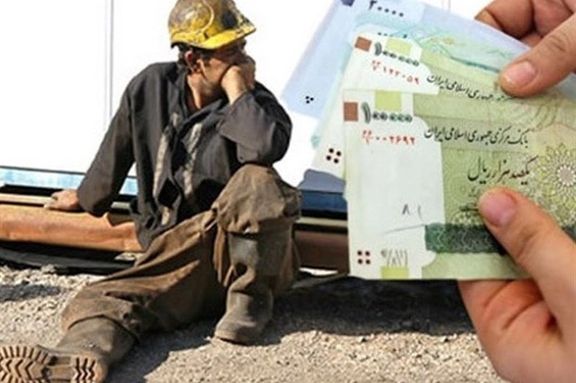
The Coordinating Council of Teachers Associations says to prevent further impoverishment of the lower class wages must be determined in US dollars.

The Coordinating Council of Teachers Associations says to prevent further impoverishment of the lower class wages must be determined in US dollars.
Abolfazl Rahimi Shad, one of the members of the association, stated that due to an unprecedented devaluation of the rial against the US dollar in the past four decades, wages have seriously lagged behind the cost for goods and services.
"Receiving salaries in rial while expenses are in dollars has led to an increase in inequality in the distribution of wealth and economic pressure on the lower classes of society," he noted.
Real incomes in Iran began to lag behind inflation after the establishment of the Islamic Republic in 1979, but salaries were increasing from 2000-2010 when monthly minimum wage hit a high of about $275 in 2010. This coincided with the time when the United Nations Security Council began imposing sanctions to force Tehran to roll back its nuclear program.
A few months into the presidency of Ebrahim Raisi, when inflation was around 40 percent, the High Council of Labor increased the minimum wage by an unprecedented 57 percent in early 2022 after two consecutive years of very high inflation. At the time minimum wage almost equaled $220.
However, the rial lost half of its value in the past 8 months and the minimum wage has dropped to around $120 a month.
Many politicians and commentators have warned that rising prices and declining incomes will lead to more protests in the coming months.
The inflation rate has risen to around 50 percent and to at least 70 percent in the food group while rents have at least doubled in less than a year.
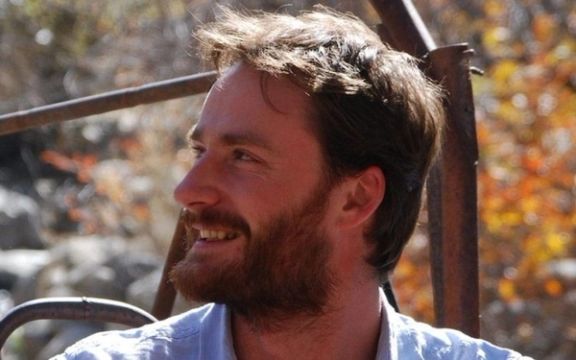
Belgium’s government has made a formal request to Iran for the return of a jailed aid worker after the signing of a controversial prisoner exchange treaty.
Olivier Vandecasteele has been held in the Islamic Republic since last year on spurious charges of “spying and cooperation with the United States, money laundering and smuggling $500,000 out of Iran.”
An Iranian court sentenced the humanitarian worker to 40 years in prison and 74 lashes, it was announced in January.
Vandecasteele, 41, has been employed by Médecins du Monde, Norwegian Refugee Council (NRC), and Relief International. He worked for humanitarian organizations in Iran for more than six years before leaving the country, but was lured back by “a girlfriend” and was detained in February 2022.
He has been subject to torture, according to Amnesty International, and is being held in solitary confinement in a windowless basement cell without access to adequate healthcare and fresh air.
Belgian Foreign Minister Hadja Lahbib confirmed on Tuesday that she had notified her Iranian counterpart Hossein Amir-Abdollahian of the transfer request.
In a social media post, she said: "I condemned his detention conditions and requested a visit by our ambassador to Iran."
A swap is being discussed between Brussels and Iran for Iranian official Assadollah Assadi, jailed in Belgium for masterminding a plot to bomb an Iranian opposition event near Paris in 2018.
In response to a legal challenge by an Iranian opposition group, the potential prisoner exchange was held up for months.
Belgium's Constitutional Court rejected a request to annul the prisoner exchange treaty with the Islamic Republic in March.
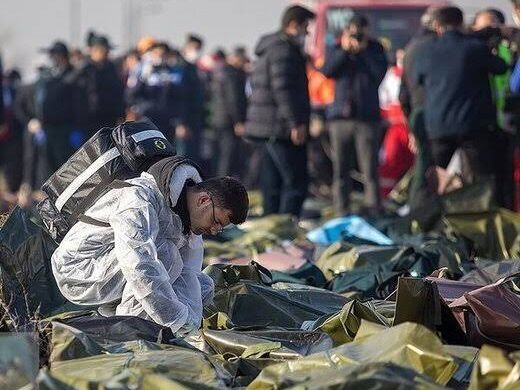
The International Coordination and Response Group for the victims of Flight PS752, shot down by the IRGC in 2020, denounces Iran’s “sham” trial for alleged culprits.
In a Tuesday statement, the response group -- which represents Canada, Sweden, the United Kingdom, and Ukraine – said, “The sham trials that took place in Tehran must not distract the world from Iran’s failure to meet its international obligations and take responsibility for its actions.”
On Sunday, a court in Iran issued sentences for 10 low-ranking military personnel in connection with the incident, sentencing a commander to 10 years in prison, while nine others were sentenced to between one and three years. The names of none of the senior military and government officials could be seen in the list, while families of victims demand to know which senior officers issued the order to fire at the plane.
In the statement, the response group said that the Islamic Republic “callously shot down Flight PS752 over Tehran," denouncing the verdicts in the criminal trials against the alleged perpetrators.
“Neither the trials nor the verdicts announced this week brings truth or justice to the families of the victims, as the entire process—starting with Iran’s biased investigation into the downing—lacked the necessary impartiality and transparency,” read the statement.
Flight PS752 of the Ukrainian International Airlines was shot down by two air-defense missiles fired by the IRGC as it took off from Tehran’s Imam Khomeini International Airport on January 8, 2020. Hours earlier, the IRGC had fired more than a dozen missiles at Iraqi bases hosting US troops in retaliation for the killing of its Quds Force Commander Qassem Soleimani in a US airstrike in Baghdad just five days earlier.
All 176 passengers and crew, including 63 Canadians as well as 82 Iranian citizens died in the disaster.
Iran first tried to deny it had shot down the plane, but when video evidence emerged, it acknowledged the incident but attributed it to human error. However, it never allowed an independent investigation and did not explain why the order was issued to shoot at a plane taking off from Tehran, or if Iran was concerned about a US retaliation, why it did not close its airspace following the attack on US bases in Iraq.
On December 28, 2022, the Coordination Group urged Iran to agree to arbitration as Tehran stonewalled over an independent investigation and proper compensation.
The statement Tuesday added, “The families of the 176 innocent victims are still waiting for the justice they deserve. We continue to stand in solidarity with the families and loved ones of the victims of the downing of Flight PS752 and will not rest until justice has been served.”
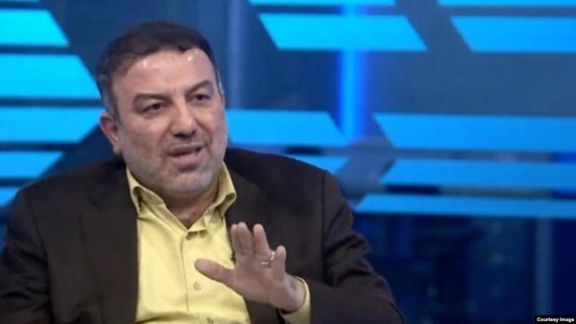
On Monday, head of the Judiciary Organization of the Armed Forces of the Islamic Republic, Ali Eftekhari, made paradoxical remarks about the case. Claiming that "the air defense system of the country was not defective" at the night of the accident, he said that "it was not possible to determine whether it was a passenger plane or a missile in the radar system at night."
Although it is common knowledge that radar is a radiolocation system that uses radio waves to detect and track objects and there is no difference in their performance between night and day. In addition, speed and trajectory of an object should clearly distinguish between a missile and a passenger plane.
Eftekhari also claimed that the IRGC did not shoot a second rocket at the plane, despite videos of the night of the incident clearly showing the second projectile.
Following the trials, families of the victims are outragedby light sentences issued for a few low-ranking military men.
Responding to the criticism about the light sentences for the alleged culprits in comparison to the harsh sentences for antigovernment protesters, Eftekhari said that those who go to the streets seek to "disrupt security" and "must" be punished but the operator behind the attack on the passenger plane meant to preserve the country’s security.
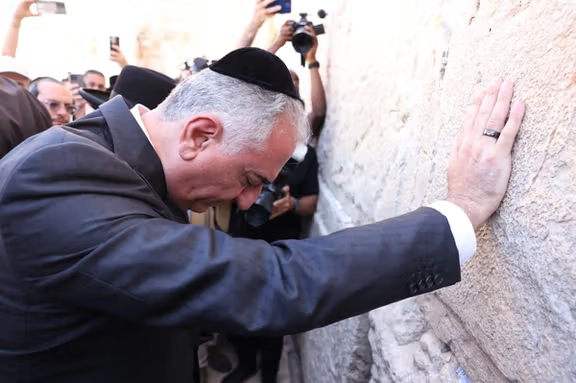
Prince Reza Pahlavi has prayed for peace between Israel and Iran on a visit to the Western Wall in Jerusalem on Tuesday.
The exiled son of the Shah voiced his hopes that one day in the future the two nations can resume their historical friendship.
Publishing a photo of himself at the Western Wall on Tuesday, Pahlavi tweeted that 2,500 years ago, Cyrus the Great liberated the Jewish people from captivity and helped them rebuild their Temple in Jerusalem.
He said: “It is with profound awe that I visit the Western Wall of that Temple and pray for the day when the good people of Iran and Israel can renew our historic friendship.”
He quoted a verse from the Holy Hebrew Bible saying, “So said Cyrus, the king of Persia, ‘All the kingdoms of the earth the Lord God of the heavens delivered to me, and He commanded me to build Him a House in Jerusalem, which is in Judea.’”
He also read Psalms, guided by a local rabbi, while praying for peace between the two nations.
Pahlavi’s visit with his wife to the Western Wall on Tuesday morning had been arranged by Israeli Intelligence Minister Gila Gamliel.
While hundreds of others prayed at the Western Wall during the Holocaust Memorial Day siren, Pahlavi stood in reflection with the rest of the congregation for two minutes.
As part of his historic visit to the Jewish state, Pahlavi also met with Israel's Prime Minister Benjamin Netanyahu in Jerusalem and attended a Holocaust Remembrance Day ceremony at Yad Vashem. Although he stood alongside Netanyahu and Israel's President Isaac Herzog, he did not make a speech.
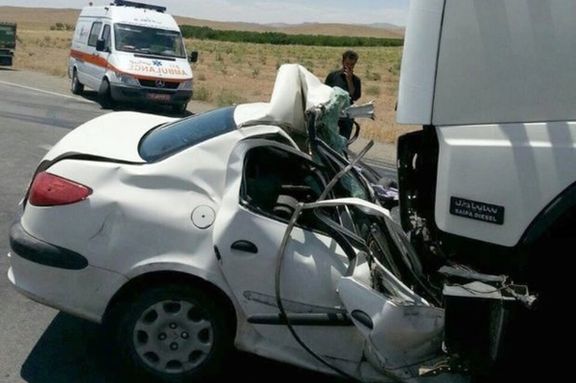
A horrific death toll of at least 1,168 fatalities has been claimed in road accidents in Iran during the new year holidays.
The shocking figure is an indictment of the poor state of roads and cars in Iran, which has one of the world’s worst traffic safety records.
The devastating total represents a rise of 22 deaths on Norwuz last year, when 1,146 people died in Iran over the holiday period.
The new figures were revealed on Monday by the head of Iran’s Forensic Medicine Organisation, Abbas Masjedi Arani: “During the implementation of a safety plan on the country's roads from March 16 to April 4, at least 1,168 people died in traffic accidents.”
The tragic death toll comes despite supposed measures and plans by the regime to improve road safety.
Iran’s Police Chief Ahmad-Reza Radan had claimed on April 1 that during the Nowruz holidays "we saw a decrease in road casualties in the country."
Nowruz is a major Iranian holiday that is celebrated annually on the first day of spring. This year, the holiday was marred by a tragic surge in road accident deaths while thousands of others were also injured.
The causes of the road accident deaths in Iran are varied. Poor road conditions, reckless driving, and inadequate safety measures are some of the main culprits, but the regime tries to convince citizens that the “human factor,” or the drivers, is the main reason.
Between March 2021 and March 2022, traffic-related accidents claimed the lives of nearly 17,000 Iranians. One person dies in a road accident every half hour in Iran according to local media.
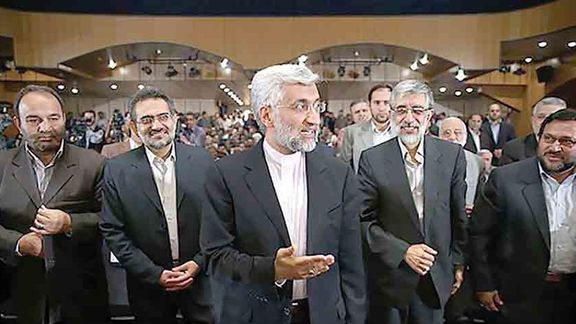
As Iran’s conservatives face an uphill task in next year’s elections, they also debate whether the regime should be a ‘republic’, or based on full clerical rule.
The sorrow state of Iran’s economy has put the conservative-hardliner forces in charge of both the parliament and the president on the back foot prior to parliamentary election next March.
Conservative politician Hossein Kanaani Moghaddam believes that parliament speaker Mohammad Bagher Ghalibaf and his allies will be among the most serious contestants within the conservative camp in the next election.
Asked how he would describe the configuration of conservative parties in the competition now that there is an all conservative government in Iran, Moghaddam said: The competition dates back to the fundamental difference in Iran's conservative camp between an "Islamic Republic" and an "Islamic government." He said each one of those ideas have their own supporters among conservatives. However, he said that without an Islamic Republic, it is impossible to create an Islamic government.
The Islamic Republic, as it exists and operates today, is based on the idea of the people's rule. However, in practice the Supreme Leader has absolute power. The interventions by Ali Khamenei and his Guardian Council and other centers of power under his control have left very little of the regime's democratic façade.
The idea of Islamic government, on the other hand, which was outlined by Ayatollah Ruhollah Khomeini the founder of the Islamic regime in Iran, is based on the idea of the holy Koran being the Constitutional Law of the government. When he came to power, Khomeini spoke very little about his book, The Islamic Government, in which Shiite clerics rather than the members of the parliament should make key decisions.
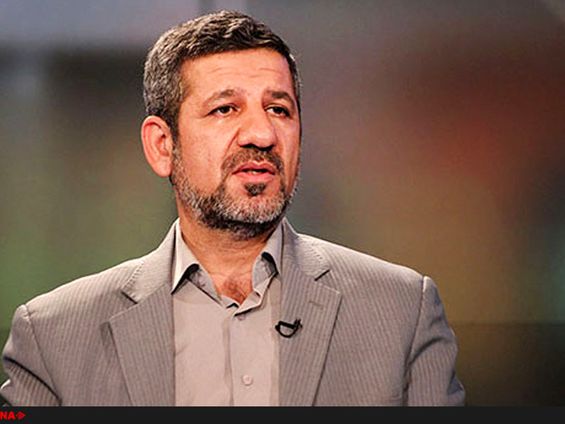
Moghaddam said that a part of the conservative camp in Iran believes in establishing an Islamic government albeit based on their own definition and interests. Another part, he said, maintain that an Islamic government is impossible without an Islamic Republic. In other words, the two groups differ on the role of the people in the government.
In Iran, the late founding father of the ultraconservative Paydari party, Ayatollah Mohammad Taqi Mesbah Yazdi said on many occasions that the people should have no part in the government and it is God who appoints the country's leaders. He even insisted that the leader's aides are also chosen by God rather than the people.
Moghaddam said that the Paydari Party is following the idea of establishing an Islamic government. He added that the two opposing conservative groups need to come to some sort of accord, otherwise, none of them can survive in Iran's political landscape. He also maintained that prejudiced support for the idea of Islamic government can deter the people and put an end to their support for the government.
Moghaddam himself is one those who believes in the Islamic Republic rather than an Islamic government. By warning about loss of popular support, he distanced himself from Paydari party which holds the majority both in the Majles and in Raisi's government. He further stressed that "talking about an Islamic government in Iran would be a mistake."
Asked how the two conservative groups can resolve this dichotomy, Kanani Moghaddam said: "They need to follow the Supreme Leader, otherwise, insisting on one of the two ideas will intensify factional infighting."
Regarding the status of Ghalibaf's "neo-con" group, he said that it is also one group among many other conservatives including traditional conservatives, moderate conservatives, conservative critics of the government, revolutionary groups and several conservative coalitions.
That degree of diversity among conservatives is healthy, but if their competition leads to conflicts and confrontations, then none of them can claim to represent the conservatives.